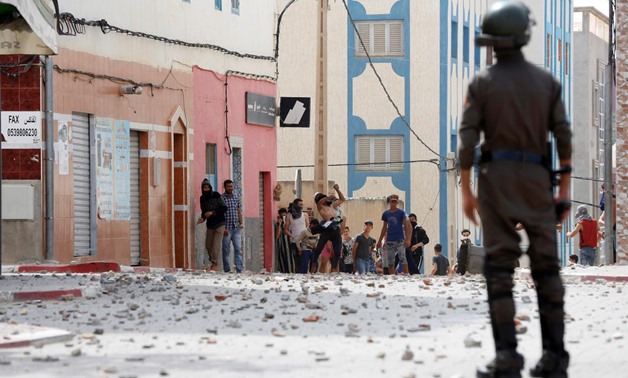
Protesters throw stones towards riot police as they demonstrate against alleged corruption in the provincial town of Imzouren, Morocco, June 2, 2017. REUTERS
CAIRO – 23 May 2018: Cairo Appeal Court received the case of the 102 defendants accused of damaging public and private property in violent demonstrations against the police; the court will schedule their first trial.
The defendants had demonstrated in January 2017 in front of Al-Mokattam police station, after the death of 22-year old Mohamed Abdel Hakim, aka Afroto, inside the Mokattam police station. Afroto suffered severe injuries that led to his death.
The defendants face charges of attacking the Mokattam police station and the Mokattam Specialized Hospital. They are also accused of damaging public and private property, and taking part in illegal demonstrations. Nine policemen were reportedly injured during the attacks.
Two policemen including an officer are accused of beating Afroto to death. Interrogations show that Afroto, accused by the police of abusing drugs, was illegally kept in custody.
According to the prosecution’s decision, policeman, Mohamed A., is accused of pushing down Afroto, while the other defendant, police officer, Mohamed S., is accused of kicking him in the chest causing him the injuries cited in the forensic report. In its statement, the prosecution accused both policemen of beating the victim to death without the intention to kill him.
The forensic report revealed that the cause of Afroto’s death was an internal bleeding caused by a broken rib, and a laceration in the left lung due to a severe hit on a solid object. The report, thus, contradicts with police allegations that Afroto died due to drugs over dose.
Moreover, the forensic report said that the rolls possessed by Afroto were filled with about 10 grams of a green plant which is not on the Egyptian prohibited list of drugs.
Earlier in September, HRW published a report accusing the Egyptian authorities of torturing prisoners, and calling on the United Nations to punish those who commit such violations. The report interviewed a number of detainees who were tortured by police in the period from 2014 to 2016, according to the report.
In response to the HRW report, the Foreign Ministry condemned "the unfounded and biased" report, which manifests unprofessionalism at its best, quoting unknown and anonymous sources.
The ministry further condemned that the group deliberately ignored the progress made in the field of promoting human rights in Egypt over the past few years, demonstrating its deliberate intention to promote and incite violence.


Comments
Leave a Comment